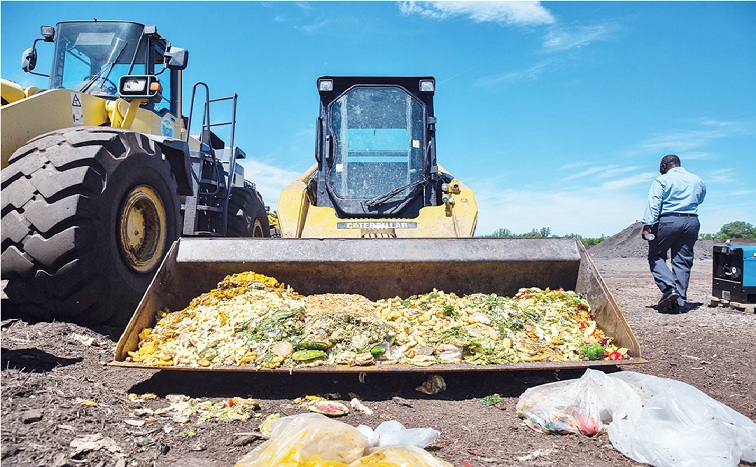How much did you leave on your plate last time you ate? A few scrapings? A couple of rogue chips? Or perhaps even a few mouthfuls you were too stuffed to finish off?
It is worth considering, then, that every time you throw leftovers away, you're not just binning tomorrow's lunch - each forkful of food was responsible for greenhouse gas emissions before it even got to your plate. Growing, processing, packaging and transporting the food we eat all contributes to climate change. And then when we throw it away, as it rots it releases yet more greenhouse gases into the atmosphere, reports BBC.
It has been estimated that if food waste was a country, it would be the third highest emitter of greenhouse gases after the US and China, according to the Food and Agriculture Organization (FAO) of the United Nations. One third of greenhouse emissions globally come from agriculture, and 30% of the food we produce is wasted - about 1.8 billion tonnes of it a year. If, as a planet, we stopped wasting food altogether, we'd eliminate 8% of our total emissions. Of course, individual households aren't to blame for all of this waste. A 2018 study found that about a third of our fruit and veg is rejected for being the wrong size or shape before it even reaches the supermarket shelf, for example.
Where food is most wasted differs across the world. In low income countries, 40% of food is wasted after it's harvested but before it makes it to people's homes, usually because of a lack of adequate infrastructure. But in middle- and high-income countries, consumers take a bigger slice of the blame: estimates suggest that households are responsible for 53% of all food waste in Europe, and 47% of food waste in Canada.
Quantifying exactly how much food we're wasting at a household level isn't easy, though. Kate Parizeau, an associate professor at the University of Guelph, and colleagues ran a study in Canada that involved digging through all the rubbish generated by 94 families living in Guelph, Ontario. They categorised the food they found based on how edible it was and how much of it there was. They discovered that each family threw out around 3kg of avoidable food waste each week, equivalent to 23.3kg of carbon emissions. Figures for the UK are comparable, with 68kg of food wasted at home each year per person, according to 2020 data from the British waste and recycling charity Wrap.
A 2018 study found that fresh vegetables and salad make up 25% of edible household food waste in the UK, for example, but only account for 12% of the greenhouse gas emissions from wasted food. On the other hand, meat and fish account for just 8% of wasted food but 19% of emissions.
Similarly, a 2015 study on food waste in Swedish supermarkets found that, though the fruit and vegetable department account for 85% of food wasted by mass over a three year period, that food only made up 46% of the total carbon footprint from wasted food. Meanwhile, meat made up 3.5% of the total mass of food that was discarded, but 29% of the carbon footprint.
How you throw your food away also matters. Organic matter rotting in a landfill releases methane, a greenhouse gas several times more potent than carbon dioxide. But if you compost your leftovers in a well-maintained bin that lets in oxygen, you'll significantly reduce the amount of methane released into the atmosphere and the carbon in the composting organic matter will be held in the resulting soil.
One study estimated that the greenhouse gas emissions from composting are just 14% of the same food dumped into landfill, while Mattias's own work found the emissions vary depending on the food, but composing bread, for example, would release just 2.2% of the emissions from putting it in landfill. Project Drawdown, a research organisation that identifies potential solutions to climate change, estimates that if composting levels worldwide increased, we could reduce emissions by 2.1 billion tonnes by 2050.
If you don't have a garden at home, you could check whether you can get your food waste collected from your home for industrial composting instead. The UK has set out plans to offer weekly food waste collections by 2023, for example, and many local authorities already do so to reduce the amount of food that ends up in landfill. In some countries, like Denmark, sending organic waste to landfill is already banned.
Still, the biggest change most people in high income countries could make is to stop buying too much food in the first place, says Eriksson. Eventually, a reduction in demand could lead us to a system where we no longer produce more food than we need. "For most people, at least in the Western world, consuming less will be something that they can actually contribute with," says Eriksson. "It is our consumption that drives the whole problem."
If your own contribution to that problem seems like a drop in the ocean, don't think of your actions in isolation. "As people start to care more about food waste in their household, they become more informed citizens," says Parizeau. "They ask questions about how the food system works, and they ask for regulation to reduce waste across the entire system."
It may take some effort, but cutting the amount of food you throw away can have a real impact on the planet.















